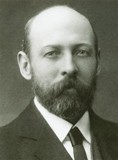 |
Member for Parramatta (New South Wales) 1901-1921 |
|
Born in Silverdale, Staffordshire, England, Joseph Cook migrated to the Lithgow district of New South Wales in 1885 to work in the coalmines. A Methodist lay preacher for much of his adult life, he believed it his duty to improve conditions for the working class from which he originated. He became involved in union and labour movement activities, serving on the Labor Defence Committee in Lithgow during the maritime strike in 1890.
In 1891 he was elected as the Labor member for Hartley in the New South Wales Legislative Assembly. He refused, however, to sign the Labor pledge in 1894 and continued on in the Assembly as an Independent Labor member, and accepted the position of Postmaster-General in the Reid government 1894-98.
At the first federal elections in 1901 Cook was elected as a Freetrader to represent the seat of Parramatta in the House of Representatives. He was solid in his opposition to the Protectionist Government behind his leader, George Reid, and grew increasingly estranged from the Labor Party. In 1908 he became Leader of the Freetrade Party and in 1909 became Deputy Leader and Minister for Defence in the Deakin Fusion Government. When Deakin resigned as Prime Minister in 1913, Cook became leader of the Liberal Party and subsequently Prime Minister, a position which he held until his party’s defeat at the election following the double dissolution in 1914. In 1917 Cook negotiated a coalition with the Nationalists led by W.M. Hughes, and he attended the Imperial War Conference with Hughes in 1918. He was Treasurer in 1920-21.
Cook resigned from Parliament in 1921 and was Australian High Commissioner in London until 1927. He was knighted in 1918.
previous | list of members | next
|


